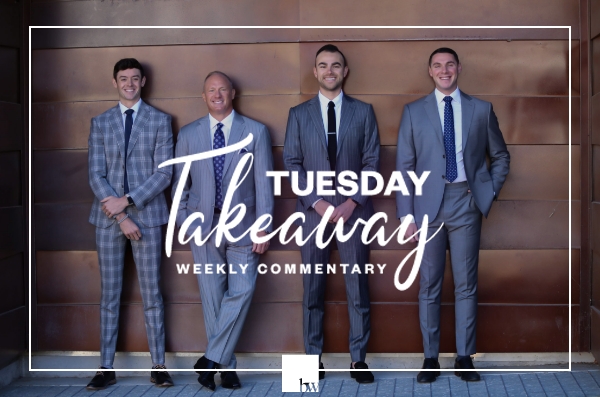| “But make no mistake: Last week was a game changer. Federal Reserve Chair Janet Yellen fretted about the high level of asset prices, the Bank of England’s Mark Carney hinted at a rate hike, and Mario Draghi suggested the European Central Bank could be nearing the end of its bond buying…The market didn’t take it sitting down. Long-term Treasury yields surged, resulting in a wider spread off of short-term bond yields.” |
A wider spread between short- and long-term Treasuries could be good news. The Federal Reserve Bank of Cleveland explained:
| “The slope of the yield curve – the difference between the yields on short- and long-term maturity bonds – has achieved some notoriety as a simple forecaster of economic growth. The rule of thumb is that an inverted yield curve (short rates above long rates) indicates a recession in about a year, and yield curve inversions have preceded each of the last seven recessions…” |
Central bankers comments affected U.S. stock markets, too. The technology sector lost its allure, while the possibility of rising interest rates made the financials sector more attractive. It didn’t hurt that all major institutions passed the Fed’s stress tests for the first time. That could translate into share buybacks and higher dividends, reported Financial Times.
There were some notable statistics during the second quarter of 2017. For instance:
Investors were preternaturally calm
Throughout second quarter, investors have been confident the Standard & Poor’s 500 Index would offer a smooth ride. The CBOE Volatility Index (VIX), a.k.a. the fear gauge, has only closed below 10 sixteen times; seven occurred during the second quarter of 2017.
Consumer sentiment was quite positive
Consumers were feeling highly optimistic throughout the quarter. In June, the University of Michigan Consumer Sentiment Survey reported, “Although consumer confidence slipped to its lowest level since Trump was elected, the overall level still remains quite favorable. The average level of the Sentiment Index during the first half of 2017 was 96.8, the best half-year average since the second half of 2000…”
Investor sentiment shifted into neutral
Last week, the number of investors who were neutral (rather than bullish or bearish) about markets hit its highest level in a year. The AAII Blog reported:
| “This year’s record highs for the S&P 500 and the NASDAQ have encouraged some individual investors, but the Trump administration’s ability (or lack thereof) to move forward on economic and tax policy remains on the forefront of many others’ minds. Also playing a role in influencing sentiment are earnings, valuations, concerns about the possibility of a pullback in stock prices, and interest rates/monetary policy.” |
The U.S. economy appears to be growing, albeit slowly. Last week, the Federal Reserve Bank of Atlanta forecast real GDP (Gross Domestic Product) growth during the second quarter of 2017 at 2.7 percent.

You Say Potato, I Say Potato.
A persistent debate among the geek set is how to pronounce the abbreviation for Graphics Interchange Format (GIF). You know, GIFs, the animated images you see online. Graphics starts with a hard ‘g’ sound, but pronunciation conventions suggest that ‘g’ makes a soft sound before the vowel ‘i.’ The Economist wrote:
| “Some questions will be pondered for all eternity. What is the meaning of life? Where do you go when you die? And, even more puzzlingly, what is the right way to pronounce “GIF?”…Debates over whether it begins with a hard “g,” as in “gift,” or a soft one, as in “giraffe,” can make discussions about religion or politics look civil by comparison. Well aware of the risk that taking a side could lead to protests, boycotts, or worse, the Oxford English Dictionary and Merriam-Webster have maintained strict neutrality. They proclaim that both pronunciations are acceptable, betraying nary a hint of favoritism.” |
It’s interesting that dictionaries, those arbiters of correct spelling and pronunciation, would stake out neutral ground. After all, in the early days of the United States correct spelling was open to interpretation. In the American Constitution, the word ‘choose’ is spelled ‘chuse’ and ‘Pennsylvania’ was spelled ‘Pensylvania’ (the Liberty Bell inscription has one ‘n,’ as well). Also, ‘defense’ was spelled ‘defence.’
The first American dictionary wasn’t published until 1806. Its author, Noah Webster, decided many spelling conventions were artificial, so he imposed the standards he preferred, changing ‘musick’ to ‘music,’ ‘centre’ to ‘center,’ and ‘women to wimmen.’ Not all of his changes were accepted.
This year, in an effort to resolve the GIF issue once and for all, a forum for computer programmers surveyed 50,000 users in 200 countries. Sixty-five percent believed a hard ‘g’ pronunciation was correct, while 26 percent believed the soft ‘g’ was right. The survey results inflamed soft ‘g’ users, who claim it was rigged.]]>


